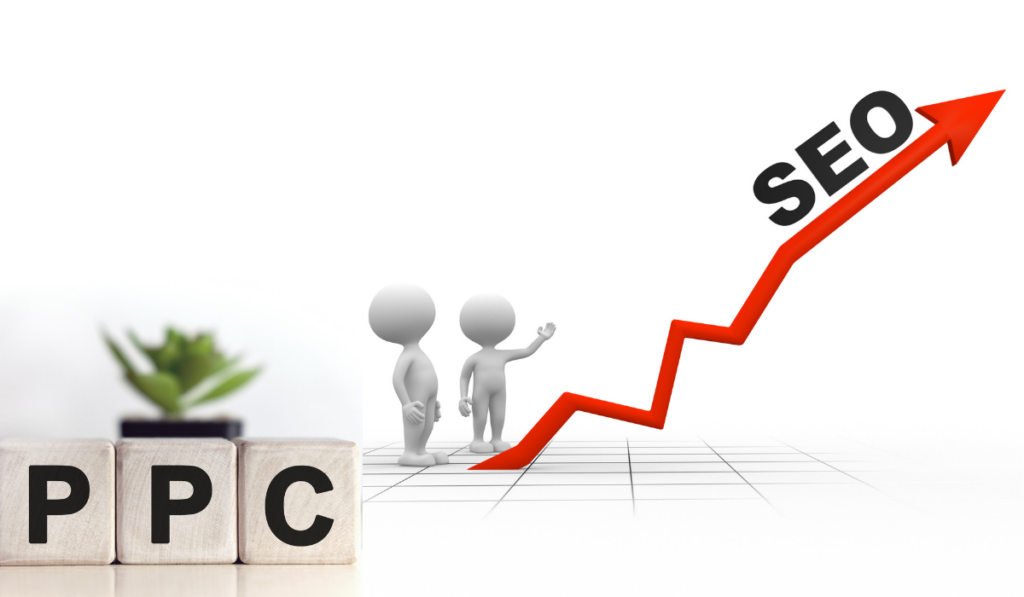In the fast-paced digital landscape, businesses are constantly seeking effective ways to increase their online visibility and attract more customers. Two popular strategies that come into play are Pay-Per-Click (PPC) advertising and Search Engine Optimization (SEO). PPC vs SEO can help drive traffic to your website, but they differ in approach, cost, and long-term benefits. This article will explore the differences between PPC and SEO and help you determine which strategy is right for your business.
What is PPC?
PPC, or Pay-Per-Click, is a digital advertising model where advertisers pay a fee each time their ad is clicked. These ads typically appear at the top or bottom of search engine result pages (SERPs) or on relevant websites. The most common platform for PPC advertising is Google Ads, but other search engines and social media platforms offer similar advertising options.
Advantages of PPC
- Instant Visibility: With PPC, your ads can start appearing on search engine results pages immediately after setting up a campaign. This means you can quickly generate traffic and potential leads for your business.
- Targeted Advertising: PPC allows you to target specific keywords, demographics, locations, and even times of day. This level of targeting ensures that your ads reach a relevant audience, increasing the chances of conversions.
- Measurable Results: PPC platforms provide comprehensive analytics and tracking tools, allowing you to monitor the performance of your ads. You can measure metrics like clicks, impressions, conversions, and return on investment (ROI), which helps in optimising your campaigns for better results.
Understanding SEO
What is SEO?
SEO, or Search Engine Optimization, improves a website’s visibility in organic (non-paid) search engine results. It involves optimising various elements on your website, including content, meta tags, backlinks, and site structure, to rank higher in search engine rankings.
Advantages of SEO
- Long-Term Results: Unlike PPC, SEO is a long-term strategy that aims to improve your website’s organic rankings over time. You can enjoy sustained visibility once you achieve higher rankings without ongoing ad spend.
- Credibility and Trust: Websites that rank highly in organic search results are often perceived as more credible and trustworthy by users. Investing in SEO can help build your brand’s reputation and establish authority in your industry.
- Cost-Effective: While SEO requires time and effort, it can be more cost-effective than PPC in the long run. Once you have optimised your website, the organic traffic it generates does not incur additional costs per click.
Which Strategy is Right for Your Business?
Considerations for Choosing PPC
- Immediate Results: If you need instant visibility and want to drive immediate traffic to your website, PPC is a suitable choice. It allows you to appear at the top of search results within a short period.
- Specific Campaign Goals: PPC is beneficial for specific marketing campaigns, such as promoting a limited-time offer or driving traffic to a landing page. It offers precise control over targeting and budget allocation.
Considerations for Choosing SEO
- Long-Term Strategy: If you want sustained visibility and to establish a strong online presence in the long run, SEO should be your focus. It requires consistent effort and patience but can yield significant results over time.
- Building Brand Authority: SEO is particularly effective for building brand credibility and authority. Higher organic rankings can make your business appear more trustworthy, which can lead to higher conversion rates.
The Synergy of PPC vs SEO
When PPC (Pay-Per-Click) advertising and SEO (Search Engine Optimization) are used together, they can create a synergistic effect that enhances your overall online presence and marketing efforts. While they may seem like competing strategies, they can actually complement each other in several ways:
- Keyword Insights: PPC campaigns provide valuable data on the performance and conversion rates of specific keywords. Analyzing this data lets you gain insights into which keywords are most effective and convert well. This information can then be used to optimise your website content for SEO, ensuring you target the right keywords to attract organic traffic.
- Testing and Optimisation: PPC allows you to test different ad copy, landing pages, and call-to-action messages in a controlled environment. By analysing the performance metrics of these tests, such as click-through rates and conversion rates, you can identify what resonates best with your audience. This knowledge can then be applied to your SEO efforts, ensuring that your website content is optimised for maximum engagement and conversions.
- Enhanced Brand Visibility: By combining PPC and SEO, you can dominate both the paid and organic search results for your target keywords. This means that your brand can appear in multiple positions on the search engine results page (SERP), increasing your visibility and reinforcing your brand presence. This level of exposure can help establish your business as a leader in the industry and increase brand recognition.
- Remarketing Opportunities: PPC allows you to implement remarketing campaigns, which target users who have previously visited your website. By using PPC remarketing in conjunction with your SEO efforts, you can create a comprehensive marketing funnel that re-engages potential customers. Remarketing keeps your brand in front of users who have already shown interest, increasing the chances of conversion and driving them back to your website.
By leveraging the strengths of both PPC and SEO, you can develop a well-rounded digital marketing strategy that drives immediate traffic through PPC, boosts organic rankings through SEO, and maximises your online visibility. This integrated approach can lead to increased brand exposure, higher conversion rates, and overall business growth.
Conclusion
In the ever-evolving digital landscape, PPC vs SEO plays vital roles in increasing online visibility and driving traffic to your website. While PPC offers immediate visibility and precise targeting, SEO provides long-term organic rankings and credibility. To maximize your online presence and achieve optimal results, a synergistic approach combining both strategies is recommended.
By leveraging PPC and SEO together, you can gain valuable insights from PPC campaigns to optimise your website’s SEO, test and optimise messaging and landing pages, enhance brand visibility across paid and organic search results, and implement remarketing campaigns to re-engage potential customers. This integrated approach can lead to increased brand exposure, higher conversion rates, and overall business growth.
Take your digital marketing to the next level with VenCube, a leading digital marketing agency specializing in driving targeted traffic, increasing brand visibility, and maximizing conversions. Contact us today to unlock your business’s digital potential and create a customized strategy that combines the power of PPC and SEO.



